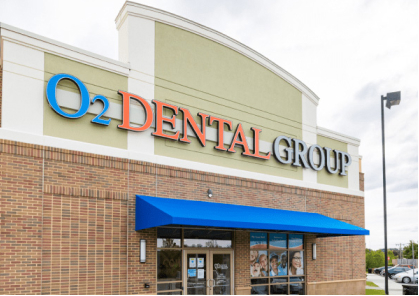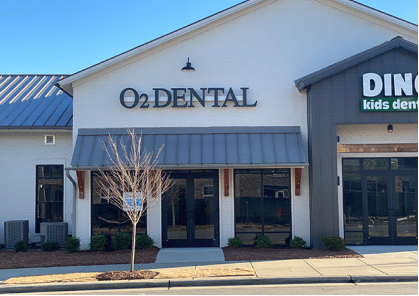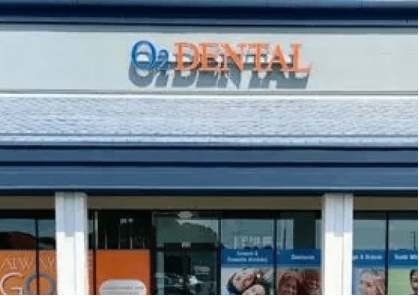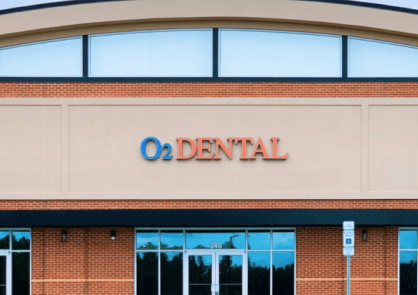Dentures
Dentures are dental prosthetics used to replace a few missing teeth or an entire arch. They are a versatile tooth-replacement option that can improve your smile, support facial muscles, and restore your ability to chew and speak, all while being easily removable.
Types of Dentures
There are various types of dentures designed to address different degrees of tooth loss. Below is a breakdown of the most common denture types.
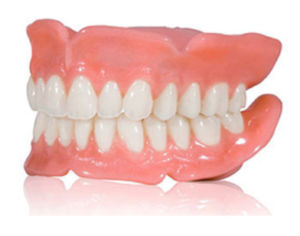
Full Dentures
Full dentures, also known as complete dentures, are designed to replace all the teeth in the upper or lower arch of the mouth when conditions such as tooth decay, trauma, or severe gum disease cause the loss of natural teeth.
Typically made from acrylic resin and porcelain, your dentist can match these dentures to your gums and natural teeth for a realistic appearance.
Pros of Full Dentures
- Non-invasive: Full dentures do not require surgical procedures, unlike other tooth replacement options like dental implants.
- Affordable: Full dentures are an affordable tooth-replacement option compared to alternatives like dental implants.
- Restore facial aesthetics: Full dentures can enhance your smile and help restore a symmetrical facial structure.
- Improved ability to eat and speak: Full dentures can restore your chewing function, allowing you to improve your diet. Additionally, dentures can improve your ability to speak by filling the gaps left by missing teeth.
Cons of Full Dentures
- Maintenance: Full dentures, unlike dental implants, need regular cleaning and maintenance to prevent damage.
- Chance of slipping: Unlike fixed tooth replacement options such as dental implant bridges, full dentures can move around the mouth, especially if they fit poorly.
- Discomfort: Adjusting to wearing full dentures can be uncomfortable and may require changes to your diet and speech patterns.
- Risk of Bone loss: Wearing full dentures for a long time can lead to bone loss in the jaw. This may happen due to the lack of stimulation from the tooth roots.
Partial Dentures
Partial dentures are used for replacing one or more missing teeth. Your dentist may recommend partial dentures when natural teeth surrounding the gap aren’t strong enough to support alternative dental prosthetics such as dental bridges.
These dentures rest on a metal framework placed on the gumline and attached to the remaining natural teeth using metal clasps or precision attachments. While the attachments keep the dentures in place, you can easily unfasten them for cleaning.
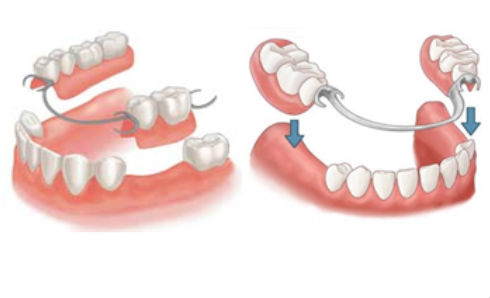
Pros of Partial Dentures
- Preservation of remaining teeth: Partial dentures can play an important role in preventing your remaining natural teeth from shifting out of place and becoming damaged by filling the gaps left by missing teeth.
- Removable: Partial dentures are removable, allowing for easy cleaning and maintenance. Moreover, the detachable design makes it easier to clean your natural teeth.
- Stable: Partial dentures are secured to your natural teeth using metal clasps, effectively reducing the risk of slippage while worn.
- Non-invasive: Partial dentures are non-invasive. Unlike alternatives like dental bridges and implants, they do not require any surgery or extensive dental procedures.
Cons of Partial Dentures
- Require Maintenance: Unlike dental bridges, which typically require less upkeep, partial dentures demand careful cleaning and maintenance to preserve their longevity and prevent damage.
- Discomfort: You may experience some irritation from the precision attachments used to hold the partial dentures in place.
- Not as stable as dental implants: Partial dentures are not as stable as dental implants surgically fused to the jaw.
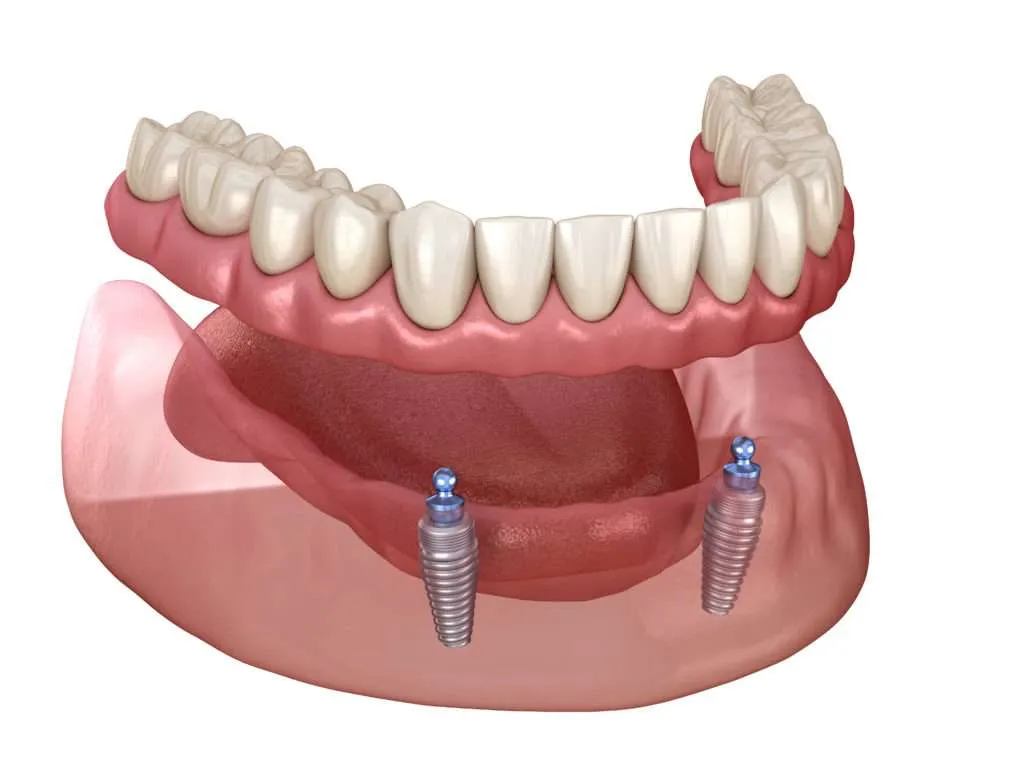
Implant-supported Dentures
Implant-supported dentures, also called implant-retained dentures, offer a technologically advanced solution to keep your dentures securely in place. These dentures are fixed on dental implants, small screw-shaped posts surgically placed into your jawbone.
There are two main types of implant-supported dentures:
- Removable implant dentures: This type of denture utilizes a precision attachment inside of your denture, anchored to several dental implants, providing a stable foundation. The dentures can be removed by the patient for daily maintenance.
- Fixed Implant dentures: This type of denture consists of a zirconia denture also known as a hybrid bridge, or all-on-four, permanently anchored to your dental implants using screws. The fixed implant denture cannot be removed by you, the patient. You must see your dentist for regular maintenance procedures.
Your dentist may recommend implant-supported dentures to replace multiple missing teeth or if you don’t have enough jawbone to support an implant-supported dental bridge.
Pros of Implant-supported Dentures
- Improved stability: Implant-supported dentures are more stable than traditional and partial dentures. The implants provide a stable foundation and anchor for the dentures.
- Jawbone preservation: Unlike traditional dentures, implant-supported dentures provide stimulation to the jawbone preventing its deterioration over time.
- Longevity: Implant-supported dentures are more long-lasting compared to other types of dentures. They can last for a lifetime with proper care and maintenance.
- Improved comfort: Since the dentures are anchored securely by the implants, they do not slip and feel more natural compared to traditional dentures.
Cons of Implant-supported Dentures
- Long treatment timeline: Unlike traditional dentures, implant-supported dentures have a more extended treatment timeline since the surgically placed implants can take several months to heal.
- Cost: Implant-supported dentures are typically more expensive compared to traditional and partial dentures.
- Risk of complications: Like any other surgical dental procedure, there is always a risk of potential complications such as nerve damage and infection.
Immediate Dentures
Immediate dentures are used as a temporary tooth-replacement option immediately after tooth extraction. Your dentist may recommend immediate dentures if you are self-conscious about the gaps left by missing teeth after an extraction.
In addition to improving your appearance, immediate dentures can help you quickly adapt to eating and speaking with dentures. Furthermore, immediate dentures provide a protective barrier for the underlying bone and gum tissue as they heal after the extraction.
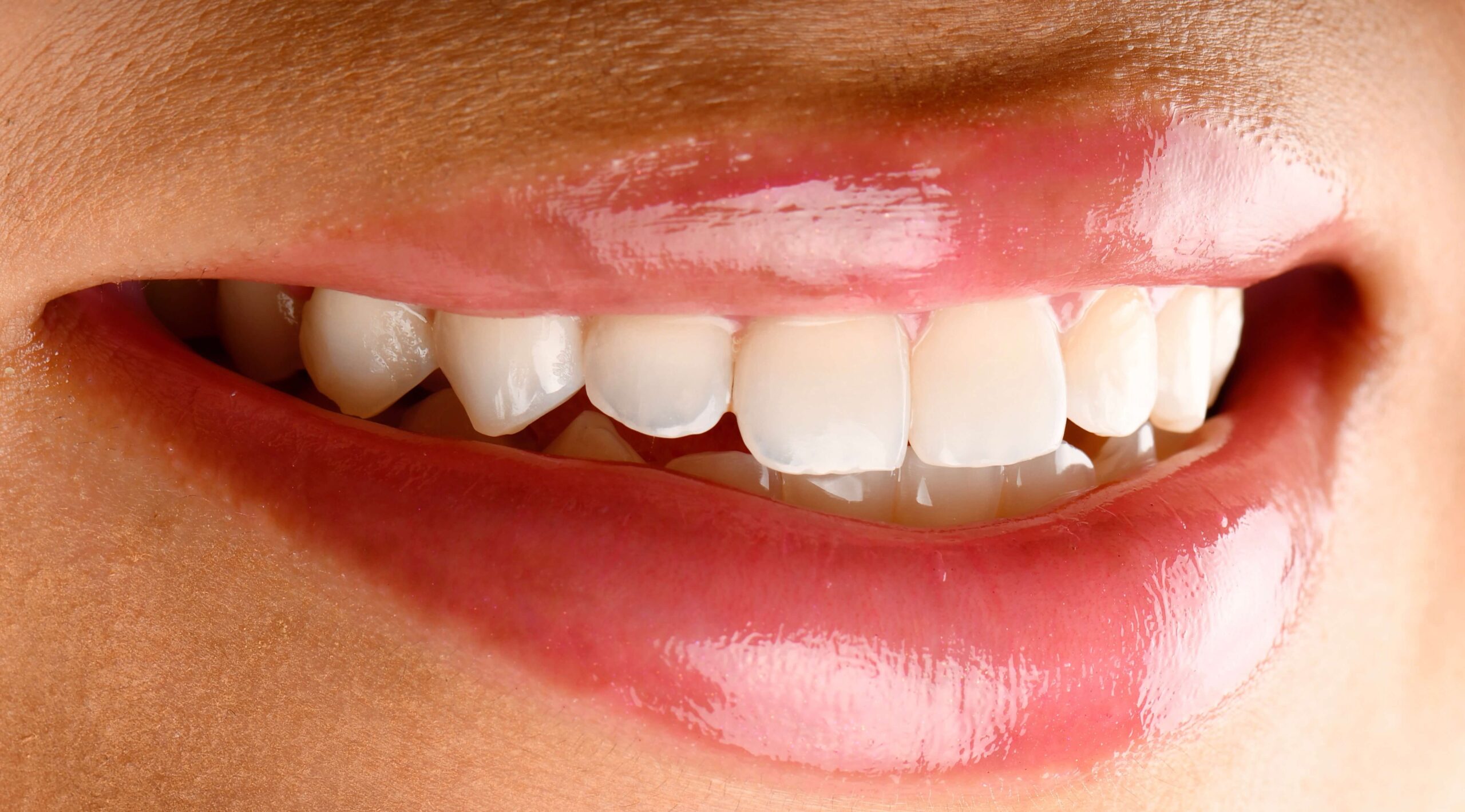
Pros of Immediate Dentures
- Aesthetically pleasing: Although temporary, immediate dentures provide a natural-looking solution for tooth replacement. They can help ease any self-consciousness due to gaps left by missing teeth while you heal from a tooth extraction.
- Preservation of facial structure: Wearing immediate dentures after having your teeth extracted can preserve your facial structure by masking jawbone shrinkage.
Cons of Immediate Dentures
- Frequent adjustments: Immediate dentures may require routine adjustments since the underlying gums and bone can change shape while healing after an extraction.
- Increased cost: Frequent adjustments and modifications increases the chance that immediate dentures may cost more than traditional dentures in the long run.
Benefits of Dentures
Dentures offer several benefits, including:
- Improving oral health: Partial dentures support natural teeth by preventing them from shifting into the gaps left by missing teeth. In doing so, they promote an even bite and reduce the risk of developing gum disease.
- Restoring facial aesthetics: Loss of teeth can lead to bone loss in the jaw, resulting in a sunken facial appearance. However, by stimulating the jawbone, implant-supported dentures can restore facial symmetry and help maintain healthy jawbone density.
- Improved quality of life: Dentures can significantly enhance your quality of life by restoring your smile and improving your ability to eat and speak comfortably. With renewed confidence, you can engage with others more comfortably in social situations and feel less self-conscious.
- Cost-effective: Dentures are generally more affordable compared to tooth-replacement options such as implants and dental bridges.
- Improved speech: Dentures can be a helpful solution for speech difficulties caused by missing teeth. The gaps left by missing teeth can lead to whistling sounds, pronunciation difficulties, and slurred speech. By filling these gaps, dentures can improve the quality of your speech.

Cost of Dentures
While dentures are often a more cost-effective tooth replacement option compared to other alternatives, such as dental implants, the total cost can vary considerably based on a range of factors, including:
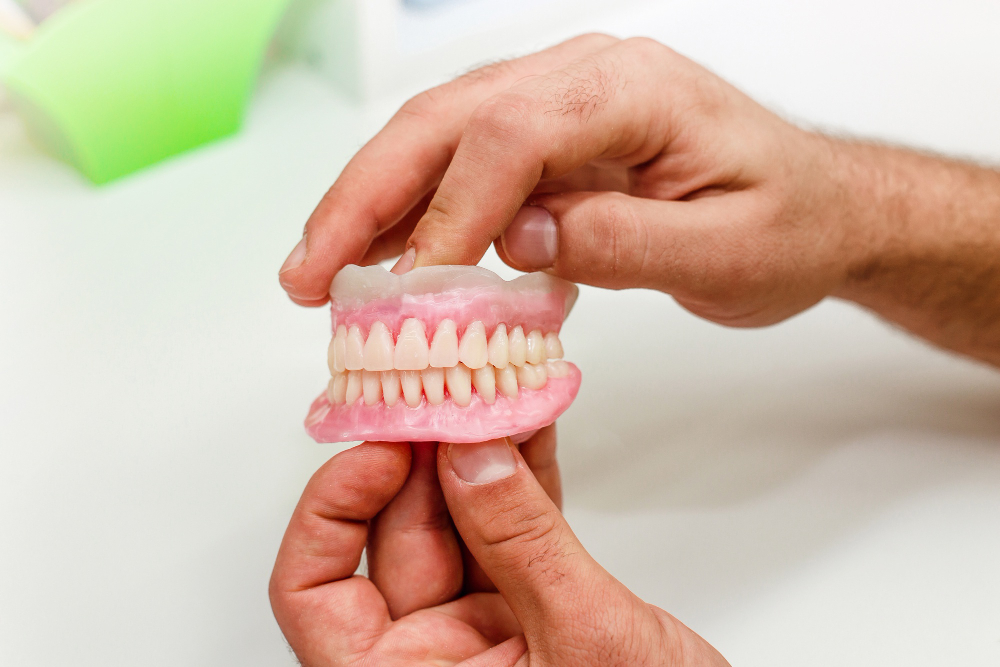
- Type of dentures: The cost of dentures varies depending on the type, with traditional dentures being comparable to the cost of partial dentures and implant-supported dentures being the most expensive option due to the additional cost of dental implants.
- Additional dental procedures: Before fitting your dentures, your dentist may perform preparatory procedures such as tooth extraction, placement of dental crowns, or bone grafting. It’s important to note that these additional procedures can increase the overall cost of dentures.
- Materials used: The cost of dentures can vary significantly depending on the type of material used. For example, high-quality materials such as zirconia, lightweight metal alloys, or flexible resin will increase the cost of dentures compared to those made from acrylic resin.
- Fabrication technique: The fabrication technique can impact the cost of your dentures. For instance, dentures fabricated using computer-aided manufacturing (CAM) are more accurate but could potentially cost more than traditional dentures fabricated using manual techniques. In some offices, there is no cost difference.
- Insurance coverage: Your dental insurance coverage can significantly affect the out-of-pocket cost of dentures. If your plan covers most or all expenses, you can avoid high out-of-pocket costs.
Process of Getting Dentures
Getting dentures is a multi-step process that may involve several appointments with your dentist. Here’s a detailed breakdown to help you prepare for the procedure.
Initial Consultation
During your appointment, your dentist will evaluate your teeth and gums to determine if dentures are a suitable tooth-replacement option for you. They will conduct a thorough dental exam, take x-rays to assess your dental health, and may take dental impressions to help with the fabrication of immediate dentures.
Additionally, your dentist will address any concerns you may have about the procedure and provide further details on payment options and insurance coverage.
Teeth Extraction
Depending on your situation, your dentist may recommend extracting teeth before beginning denture treatment. In most cases, they may fit you with immediate dentures to protect your underlying gums and bones as they heal while also helping you adapt to speaking and eating with dentures.
Impression Taking
Your dentist will take multiple impressions of your mouth using dental putty or a digital scanner. Typically, this procedure is performed after your gums have fully healed following a tooth extraction. By waiting for your gums and bones to heal, your dentist can obtain more precise results, as the surrounding tissues may shrink during the healing process. They will send these impressions to a specialized dental lab to serve as a model for creating your dentures.
Bite Registration and Wax Try-in
To ensure a precise fit and accurate results, your dentist will perform a bite registration to record the exact position of your upper and lower jaws. This process involves biting down on a soft, waxy material, which your dentist will use to create a wax replica of your dentures. They will use this replica to assess your dentures’ fit, size, shape, and alignment and make any necessary adjustments.
Final Denture Fabrication
Your dentist will consult with you to ensure that the wax replica of your dentures fits well and meets your aesthetic preferences before proceeding with the fabrication process, which may take several weeks. If you are uncomfortable going without teeth during the waiting period, your dentist may recommend immediate dentures.
Final Fitting
Once your dentures are ready, your dentist will schedule a final fitting appointment to make any necessary adjustments to the bite and shape of the dentures, ensuring a comfortable and perfect fit in your mouth. To ensure your dentures function correctly and remain comfortable, your dentist will schedule follow-up appointments after the initial fitting to monitor and maintain their condition.
A Note About Digital Dentures
Technology advancements today through 3D printing technology make it possible to eliminate most of the traditional steps in denture fabrication. This makes it possible to receive your dentures in potentially one to two visits with more accuracy and predictability.
While the denture procedure may vary depending on your situation, you should choose a reputable dental professional with experience in providing denture services. Given the complexity of the process, a skilled and experienced dentist is essential to ensure that your dentures fit comfortably and function properly.
Dentures provide an affordable and effective solution for replacing missing teeth. Various options, including traditional, partial, implant-supported, and immediate dentures, can address different degrees of tooth loss. Dentures are easy to maintain and, with proper care, can last for years. If you’re considering dentures, you should contact us to schedule a consultation with one of our dentists who can go over the various options and help you determine the best one for your needs.
We Offer Dentures in These Cities
Schedule Today!
We look forward to meeting you. Call us or request an appointment online to set up your first visit. We’ll be in touch soon.

